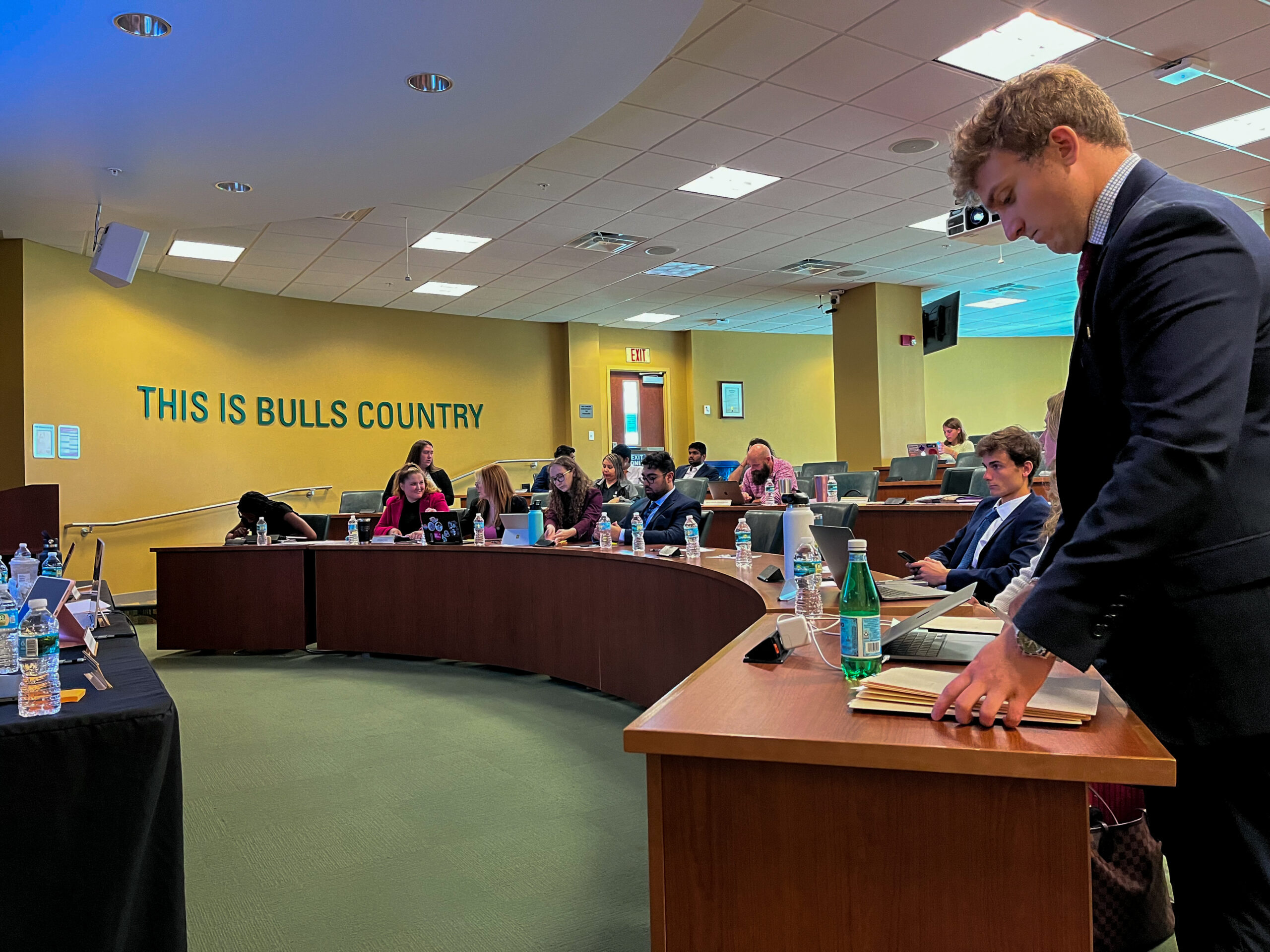Transition of presidential power delayed by SG Supreme Court trial

Ensuing the Elections Review Committee (ERC) v. Solano and Malanga trial ticket this Sunday, the Student Government (SG) Supreme Court discussed a grievance violation raised against presidential and vice presidential nominees Sebastian Solano and Jessica Malanga by the ERC.
Trial proceedings were held both virtually on Microsoft Teams and in-person in the Marshall Student Center SG chambers from 3 to 8:20 p.m.
Opposing presidential and vice presidential ticket Cesar Esmeraldi and Elizabeth Volmy filed their grievance on March 1 with the claim that two campaign tabling events hosted by Solano and Malanga on Feb. 28 were unauthorized. At both sites, witnesses for the prosecution stated that they observed Malanga and Solano standing outside of the Rec and the Hub offering drinks and snacks to those passing by.
The consolidated statutes that the ERC brought into question – or 700.57 and 706.5.8.8.5 – state that setting up or operating an unauthorized polling station unsanctioned by ERC staff or SG employees is a major violation, according to the SG consolidated statutes. Counsel for the defense also introduced a revision to SG statute 706.2 on the nature of QR codes used by candidates during campaigning.
With the evidence provided, including pictures of the polling sites as well as witness testimonies, the lawyer for the ERC argued that the tables used by Malanga and Solano were not sanctioned by SG and therefore, not serving as authorized polling sites in accordance with SG statutes.
One witness stated that he observed two students vote after being offered beverages at an alleged unauthorized polling table in front of the Rec, to which Solano and Malanga’s lawyer argued did not qualify as sufficient evidence that the candidates endorsed themselves as multiple people were also seen entering and exiting the building without a drink.
“You stated that you saw the defendants campaigning with drinks, is that correct? Did you tell any of those campaigners that you voted? Did they give you a drink? In response to the question, a gift or favor was not given to those who don’t vote for Sebastian Solano and Jessica Malanga,” he said.
“In your statement, you said ‘woah, so basically they asked people to vote for them in order to get a drink’. Is that a fair characterization?”
The defense’s lawyer also stated that the provision of QR codes on campaign flyers during most presidential and vice presidential campaign events made the argument of Esmeraldi and Volmy’s counsel inaccurate. Furthermore, the defense alleged that Esmeraldi had previously campaigned at a Colombian Student Association event as well as at student government events prior to voting.
SG Director of Elections Laura Shaw wrote in an email to The Oracle that the ERC’s concern in their investigation relied on the belief that Solano and Malanga utilized QR codes that led to voting links at their unauthorized polling sites, which they alleged asked students to vote for them. She added that the prosecution argued the polling stations set up by Malanga and Solano bore a resemblance to the authorized polling stations that were run by the ERC and SG officials, which the ERC believes directly violated statutes 700.57 and 706.5.8.8.5.
Snacks and beverages provided by Solano and Malanga could not have constituted bribery given that SG allegedly approved the candidates handing them out over email, according to the defense’s counsel.
” … That suggests that those things constituted bribery, which again, we are not on trial for. And as we’ve defined bribery, explicitly, is not something that was approved. The ERC has approved the defendants in email to hand out both drinks as facts along with a flier, so it’s impossible to say that it was bribery,” he said.
In cross examination and witness questioning, Solano and Malanga’s counsel also made the argument that since the definition of a polling station is not clearly outlined in SG statutes, and as witnesses could not come to a clear consensus of what constitutes a station, there are no legal grounds to claim that the tabling events on Feb. 28 were used for personal campaigning.
An official verdict was not announced at the time of the meeting. Supreme Court deliberations will conclude and be released in 10 days, according to SG Senate President Ashria Daskundu.







